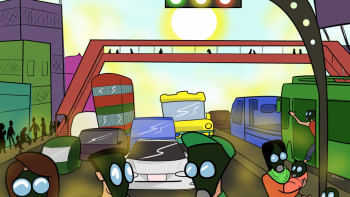Acknowledge negativity, but don’t ignore the positive

On the bookshelf in my sitting room is a painted green box from India. Inside the box is a World War II medal that was awarded to my maternal grandfather. He did not give it to me personally; he had misplaced it decades before his death. But one day, several years ago, I got an email from a Canadian man, a stranger, who said that, as a hobby, he purchases military items on eBay and then tries to reunite them with the families of the owners. He does not charge for the service. A brief flutter of emails ensued, and then he sent me the medal. I felt a reconnection with my grandfather, and the stranger enjoyed the sensation of performing a good deed.
More recently, while visiting people in the United States, I witnessed a snowstorm—and for the first time ever, tried to shovel snow. The person I was staying with had just moved and couldn't locate her snow shovel. I went next door, rang the bell, and borrowed one from a woman I'd never met. The path from the house to the street was steep and slippery, and I was moving cautiously (not to mention clumsily). The man across the street (whom I'd also never met) suddenly appeared in front of me, holding a snow shovel. "Do you need help?" he asked, and proceeded to shovel for me. A few days later, the doorbell rang; another neighbour dropped by to proffer some helpful advice on the important topic of how to feed one's pet snake. For those couple of days, the city I was staying in felt like a small town.
We talk a lot about stranger danger, about the bad things that people do to each other. It is easy to feel discouraged when confronted with endless negative news stories. Those news stories are real. People do many bad things. But that shouldn't cause us to forget about all the good that people quietly do, day in and day out, with no expectation of a reward.
I once heard of a man who was walking along a village road and suddenly found himself in a pond; before he was aware of what was happening, he had jumped into the water to rescue a drowning child he'd glimpsed out of the corner of his eye. His most basic instinct was to save the child he hadn't even properly seen.
Random acts of kindness are not limited to rural areas and small towns. Surely my readers have seen people shouting at women on rickshaws, making them aware of when the ends of their clothing are in danger of getting caught in the wheel of the vehicle. Here in Dhaka, I once watched a rickshaw puller leap off his rickshaw to save a colleague of mine, a young woman who was learning to cycle. His rickshaw got smashed up in the process, but his sole focus was on helping the woman. (We paid for the repairs to his rickshaw.)
We talk a lot about stranger danger, about the bad things that people do to each other. It is easy to feel discouraged when confronted with endless negative news stories. Those news stories are real. People do many bad things. But that shouldn't cause us to forget about all the good that people quietly do, day in and day out, with no expectation of a reward.
People assign varying weights to their experiences, and so some of us focus on the positive: acts of kindness, friendliness, selfless concern for others. I think of strangers who have taken the time to guide me when I'm lost in their city, offered me help with lifting a heavy box, or exchanged a friendly greeting with me. Their selflessness sometimes stuns me. One day, I watched as two children looked with commiseration at a street dog. The boy asked his sister if she had any money; when she replied that she had Tk 10, he told her to go buy a small packet of biscuits, while he hunted around for a discarded container in which to give the dog water to wash down the snack. Another day, as I was about to enter a restaurant, a young boy begging on the footpath approached me. "You feed the dogs at the cricket field?" he asked. I nodded in assent. He smiled approvingly. "Enjoy your meal," he replied, and wandered off.
Yes, it's important to acknowledge the negativity around us so that we can seek and implement solutions to it. But let us never forget to notice the goodness that is also all around us, and that gives us hope in the possibility of working together towards a better society, a better nation, a better world.
Debra Efroymson is executive director of the Institute of Wellbeing, Bangladesh.
Views expressed in this article are the author's own.
Follow The Daily Star Opinion on Facebook for the latest opinions, commentaries and analyses by experts and professionals. To contribute your article or letter to The Daily Star Opinion, see our guidelines for submission.

 For all latest news, follow The Daily Star's Google News channel.
For all latest news, follow The Daily Star's Google News channel. 










Comments